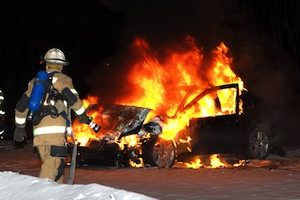 One of the most horrendous dangers to which a victim of a motor vehicle accident may be exposed is the possibility of a fire. Gas spills, fuel leaks, explosions can all contribute to a post-collision fire. If a motor vehicle passenger can survive an accident without receiving serious injuries from the crash forces, he should not receive serious injury, and he certainly should not die, because of a fire which breaks out during or after the collision. Although motor vehicle engineers agree that a vehicle occupant should not burn in an otherwise survivable crash, there are motor vehicles on the road today with fuel systems that are more likely to result in a post-collision fuel fed fire than they should be.
One of the most horrendous dangers to which a victim of a motor vehicle accident may be exposed is the possibility of a fire. Gas spills, fuel leaks, explosions can all contribute to a post-collision fire. If a motor vehicle passenger can survive an accident without receiving serious injuries from the crash forces, he should not receive serious injury, and he certainly should not die, because of a fire which breaks out during or after the collision. Although motor vehicle engineers agree that a vehicle occupant should not burn in an otherwise survivable crash, there are motor vehicles on the road today with fuel systems that are more likely to result in a post-collision fuel fed fire than they should be.
In some cases, the fire could have been avoided if the fuel tank had been properly located or shielded. Placing the tank in a location where it is protected from crash forces and from contact with other parts of the vehicle during an accident is essential to protecting an occupant from a fire. Unfortunately, some vehicles on the road today have the fuel tank located behind the rear axle, making it totally unprotected in a rear-end collision. Fuel tanks are usually made of lightweight aluminum, steel or plastic which are easily compromised during a crash. Without proper shielding, a simple bolt can easily penetrate a fuel tank, allowing fuel to escape and burn. Fires may also break out because of an electrical short under the hoods, where a number of combustible fluids are housed.
Post-collision fuel fed fires are especially likely to occur in heavy trucks. In 18-wheelers, the tanks are often located outside frame rails, sometimes under the steps – a prime impact area. Heavy truck manufacturers have refused to shield their tanks.For over 50 years, automotive manufacturers have known that fuel can spill out, especially during a rollover accident. This can be the result of fuel lines being in an area susceptible to crush, fuel lines being unshielded, or fuel lines made of materials such as plastic which can be compromised in heat. Once fuel lines are broken, fuel can flow out of the tank due to the forces of gravity and be ignited by sparks from the crash or from a charge in a loose wire.
Survivors of a vehicle fire are often faced with huge medical expenses throughout their life. It is also likely that survivors will be unable to enjoy life like they did before the fire. A survivor may also not be able to earn the same income he did before the accident. The lawyers of Wolff Ardis, P.C. will help you determine who is at fault for the injuries and the extent of damages suffered.
If you or a loved one has been injured in an accident in which a post-collision fire erupted, the experienced lawyers of Wolff Ardis, P.C. can help you investigate to determine if you have a claim for a defective fuel system.







